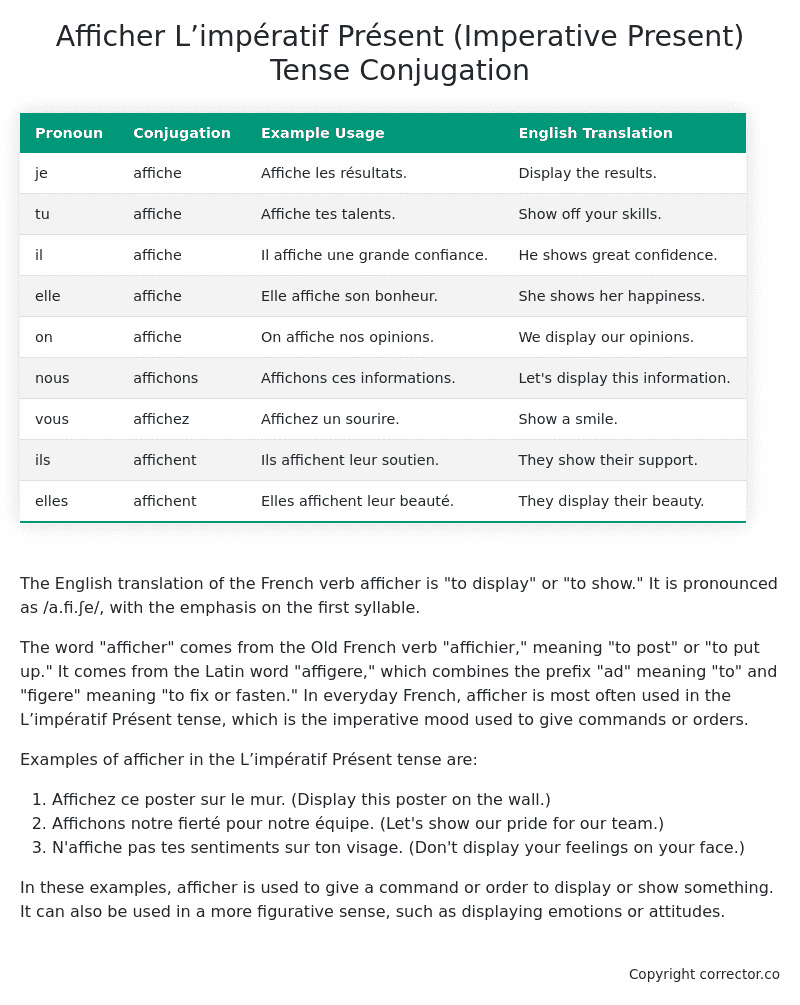L’impératif Présent (Imperative Present) Tense Conjugation of the French Verb afficher
Introduction to the verb afficher
The English translation of the French verb afficher is “to display” or “to show.” It is pronounced as /a.fi.ʃe/, with the emphasis on the first syllable.
The word “afficher” comes from the Old French verb “affichier,” meaning “to post” or “to put up.” It comes from the Latin word “affigere,” which combines the prefix “ad” meaning “to” and “figere” meaning “to fix or fasten.” In everyday French, afficher is most often used in the L’impératif Présent tense, which is the imperative mood used to give commands or orders.
Examples of afficher in the L’impératif Présent tense are:
- Affichez ce poster sur le mur. (Display this poster on the wall.)
- Affichons notre fierté pour notre équipe. (Let’s show our pride for our team.)
- N’affiche pas tes sentiments sur ton visage. (Don’t display your feelings on your face.)
In these examples, afficher is used to give a command or order to display or show something. It can also be used in a more figurative sense, such as displaying emotions or attitudes.
Table of the L’impératif Présent (Imperative Present) Tense Conjugation of afficher
| Pronoun | Conjugation | Example Usage | English Translation |
|---|---|---|---|
| je | affiche | Affiche les résultats. | Display the results. |
| tu | affiche | Affiche tes talents. | Show off your skills. |
| il | affiche | Il affiche une grande confiance. | He shows great confidence. |
| elle | affiche | Elle affiche son bonheur. | She shows her happiness. |
| on | affiche | On affiche nos opinions. | We display our opinions. |
| nous | affichons | Affichons ces informations. | Let’s display this information. |
| vous | affichez | Affichez un sourire. | Show a smile. |
| ils | affichent | Ils affichent leur soutien. | They show their support. |
| elles | affichent | Elles affichent leur beauté. | They display their beauty. |
Other Conjugations for Afficher.
Le Present (Present Tense) Conjugation of the French Verb afficher
Imparfait (Imperfect) Tense Conjugation of the French Verb afficher
Passé Simple (Simple Past) Tense Conjugation of the French Verb afficher
Passé Composé (Present Perfect) Tense Conjugation of the French Verb afficher
Futur Simple (Simple Future) Tense Conjugation of the French Verb afficher
Futur Proche (Near Future) Tense Conjugation of the French Verb afficher
Plus-que-parfait (Pluperfect) Tense Conjugation of the French Verb afficher
Passé Antérieur (Past Anterior) Tense Conjugation of the French Verb afficher
Futur Antérieur (Future Anterior) Tense Conjugation of the French Verb afficher
Subjonctif Présent (Subjunctive Present) Tense Conjugation of the French Verb afficher
Subjonctif Passé (Subjunctive Past) Tense Conjugation of the French Verb afficher
Subjonctif Imparfait (Subjunctive Imperfect) Tense Conjugation of the French Verb afficher
Subjonctif Plus-que-parfait (Subjunctive Pluperfect) Tense Conjugation of the French Verb afficher
Conditionnel Présent (Conditional Present) Tense Conjugation of the French Verb afficher
Conditionnel Passé (Conditional Past) Tense Conjugation of the French Verb afficher
L’impératif Présent (Imperative Present) Tense Conjugation of the French Verb afficher (this article)
L’infinitif Présent (Infinitive Present) Tense Conjugation of the French Verb afficher
Struggling with French verbs or the language in general? Why not use our free French Grammar Checker – no registration required!
Get a FREE Download Study Sheet of this Conjugation 🔥
Simply right click the image below, click “save image” and get your free reference for the afficher L’impératif Présent tense conjugation!

Afficher – About the French L’impératif Présent (Imperative Present) Tense
Usage
Giving commands
Making requests
Offering advice
Expressing desires
Conjugation Formation
Interactions with other tenses
Want More?
I hope you enjoyed this article on the verb afficher. Still in a learning mood? Check out another TOTALLY random French verb conjugation!


